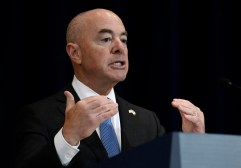Cybersecurity top of mind during pre-G20 trip to Beijing
Cybersecurity negotiations were a key part of U.S. National Security Adviser Susan Rice’s recent trip to Beijing in an effort to strengthen U.S.-China relations ahead of this year’s G20 Leaders’ Summit.
The negotiations centered on an influential digital security agreement made last year between U.S. President Barack Obama and Chinese President Xi Jinping, according to a press release distributed by the White House. The agreement was designed to curb nation-state sponsored economic espionage, which has wreaked havoc in the private sector.
A cyber threat intelligence report revealed last month by California-based security firm FireEye shows that cyber attacks targeting the U.S. that originate from China have decreased since the Obama-Xi deal was made public in September 2015.
Following the FireEye report, several U.S. officials confirmed its findings. These officials — like Assistant Attorney General for National Security John Carlin — have been careful to praise the progress without adding a touch of skepticism.
“There’s a debate as to how long-lasting that might be, but there has been a change,” Carlin explained in a speech at the Center for Strategic and International Studies in Washington, D.C., last month.
[Read More: Cyber firms say Obama peace deal with China hurt our business]
During her trip, Rice met with the top brass from the Communist Party of China, including President Xi, State Councilor Yang Jiechi, General Fan Changlong and Secretary Meng Jianzhu.
Regarding future cybersecurity cooperation between the U.S. and China, the larger message that Rice hoped to leave her Chinese counterparts was one of cautious optimism, said Adam Segal, director of digital and cyberspace policy at the Council on Foreign Relations.
Segal said Rice likely sought to establish the promise of future cyber coordination during discussions while making it clear that the U.S. will expect China to abide by existing agreements under a new U.S. administration.
“The U.S. government is signaling that ‘the war is not won,’ the decline could be temporary, and they are expecting Beijing to follow through,” Segal said.
James Lewis, senior vice president and director of the Strategic Technologies Program at the Center for Strategic and International Studies said it looks like the Chinese are living up to the agreement, but the White House is worried about backsliding.
‘Letting the Chinese know the U.S. is watching increases the chances of compliance,’ Lewis said. ‘It’s the old Reagan line about ‘Trust, but verify.’ I think the Chinese are living up to the agreement for a whole set of reasons, many of which are domestic, but it doesn’t hurt to keep an eye on them.’
Security officials for the U.S. and China have met multiple times in the last year to discuss cybersecurity cooperation efforts. A working group comprised by the Department of Homeland Security and China’s Minister of Public Security, for example, have now met twice.
“Both sides believe that this ministerial meeting and regular engagement between the Ministry of Public Security and the Department of Homeland Security are essential to ensure the growth and development of a productive homeland security and law enforcement relationship,” a DHS press release following one DHS-MPS meeting reads.
Rice described the trip to China in a Medium blog post published by the White House’s official account, which can be read in full here.






